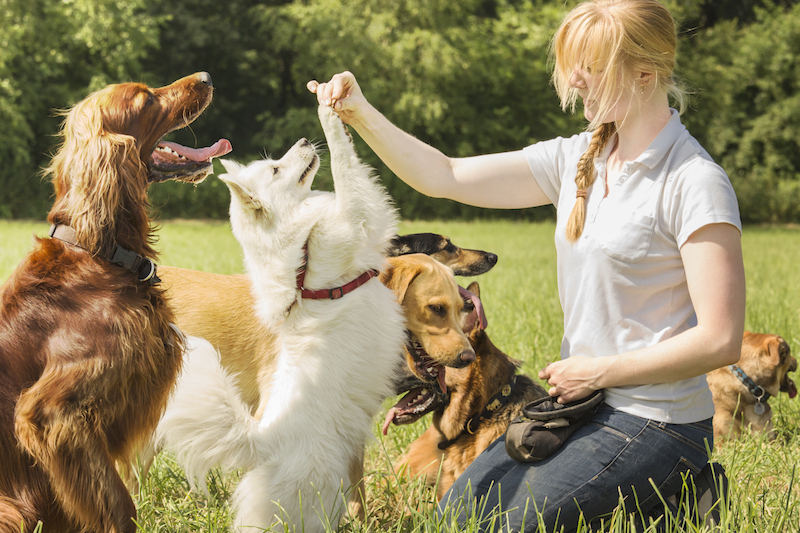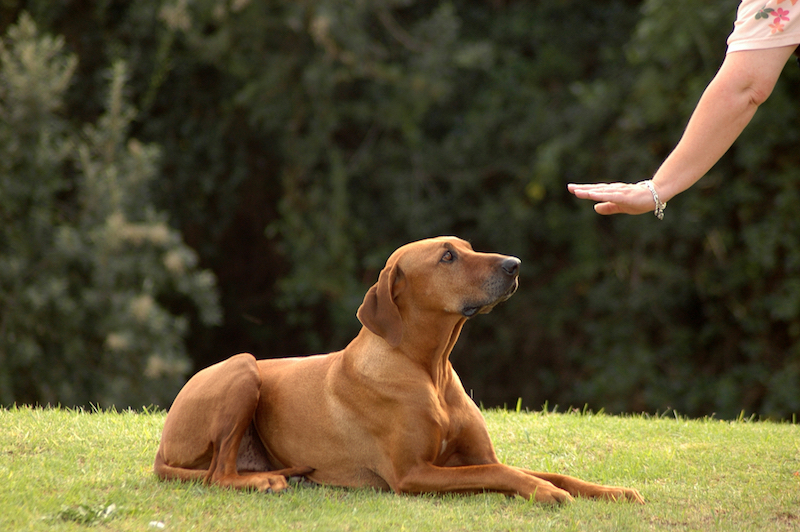Training your dog can sometimes feel like a serious feat. We get it! It takes a lot of effort and hard work upfront…and kinda like toilet-training a mini-human, the pay-off seem a long way off.
But here’s the thing. A well-trained pooch is a happier pooch. When you train your dog to respond to commands and to socialise well, you’re keeping them safe and sound in the long-run. Not only that, but it makes them 100% more adaptive to future travel adventures, where they’ll often need to respond quickly and safely in unfamiliar situations. To understand the importance of making an investment in training your pets, you can read our post Training Commands Your Dog Needs To Master.
But training your dog is definitely a team effort, and while the best results come from sustained effort at home, employing a professional trainer offers a fantastic foundation when you’re getting started. Whether you elect private tuition or group training classes, and whether you’ve got a puppy or an older dog on your hands, there’s training out there to suit your needs.
Because dog training is an unregulated industry, it can be hard to sort fact from fiction and figure out who REALLY knows their stuff. After all, you want to be sure that your pet is in the best hands possible, right?! To help you do exactly that, we’ve compiled our best tips on picking a dog trainer, including what you need to look for and the questions you should ask.
Where Can You Find A Dog Trainer?
First of all, you’ll need to source some trainer candidates for your consideration. Your best bet is always word-of-mouth. Ask around for recommendations from like-minded pet owners at the local dog park, and professionals at vet clinics and groomers. This will give you an unfiltered understanding of what you can expect from a trainer – their specialities, their offerings and their overall approach. And of course, we’re living in an online age – so many pet trainers will have websites and social media platforms. Be sure to check out their customer testimonials and Facebook reviews. And if you can’t see any? Either reach out and request some…or take it as a sign to stay away!
What Type Of Dog Training Do You Want?
There are tons of options when it comes to the type of training you can purchase for your pet. From the size of the classes to the specific skills taught, you should consider your pet’s age, temperament, abilities and any areas of improvement you’d like to focus on. Will you go for group classes or private tuition? Both offer different benefits. If you have a puppy, small group classes will offer great socialisation opportunities right from the get go. However, if you have a reactive dog who struggles to concentrate around other pets, a private lesson will minimise these potential distractions.
If your dog has behavioural issues, trainers will often reccomend private lessons, as it gives them a chance to come to your home and encounter your pet in it’s regular environment. Some trainers will also supplement these visits with telephone and email support, which can be invaluable when you’re in the early stages of implementing new strategies and trouble-shooting any problems.
In all scenarios, but especially if you’re participating in group classes, you’ll want to make sure that your pooch is up to date with all vaccinations and has had a routine check-up with their vet.
What Kind Of Dog Training Approach Should You Look For?
The dog training industry is largely unregulated. This makes it very easy for someone to call themselves a trainer, without having a solid theoretical understanding of animal psychology and best-practice training principles. That’s why it’s crucial for you to be on the look-out for tell-tale signs of outdated approaches that may do more harm than good.
LOOK FOR: The Rewards-Based Approach:
It’s now commonly accepted that the most humane and effective methods of training are rewards-based (sometimes referred to as positive reinforcement). This means that the trainer will either give rewards when reinforcing positive behaviour or withholding rewards when eliminating negative behaviours. While there can be different types of rewards, food is a go-to because it offers immediate reinforcement.
AVOID: The Aversive Training Approach:
This technique stands in contrast to more aversive techniques, which ultimately produce negative short and long-term outcomes and make your dog more aggressive and fearful. When researching potential trainers, look out for warning signs that signal these methods. Examples include:
- any mention of dominance theory, ‘pack leaders’ or ‘alphas’ (these are terms that allude to outdated training strategies that favour dominance, punishment and control)
- any mention of physical techniques like kicking, poking, leash jerks or ‘alpha rolls’
- if there is any affiliation between the trainer and their own or other retail shops, selling equipment such as shock or prong collars
For more information on why positive reinforcement techniques are the superior (and more humane) option when it comes to dog training, check out this informative article.
When considering their training approach, you want to consider how they interact with the pets in their care AND the owners in their classes. A large part of any trainer’s role is to be an engaging, encouraging teacher who can work closely with owners to build their confidence and understanding of the training strategies being learnt in the class. So, it’s important that you feel comfortable with the trainer and that they can communicate clearly and effectively.
What Kind Of Qualification Should You Look For?
This is a tricky one to answer definitively. Because the industry is unregulated, there is no single qualification a trainer needs to possess in order to legally operate. Our best advice would be to seek someone with a professional qualification from a TAFE or Registered Training Organisation.
This criteria will mean your potential trainers have a strong theoretical understanding of dog psychology, body language and physiology, as well as a range of reward-based strategies and protocols suited to specific behavioural and development challenges.
The National Dog Trainers Federation (NDTF) is Australia’s only government-approved provider for professional canine trainers and offer a nationally recognised Certificate III in Dog Behaviour and Training.
Other dog obedience assessment programs that have been approved under the Domestic Animals Regulations 2015 are:
- DOGS Victoria
- Australian Association of Professional Dog Trainers Inc
- The Gentle Dog Trainers Association
- Four Paws K9 Training
Better still, quality dog trainers will likely engage in ongoing professional development. They will continue to take relevant courses to specialise and stay abreast of current best practice. They may also be affiliated with professional associations. This information will be available on their website or on request, so don’t hesitate to ask more questions so you can feel confident in their skillset.
Any trainer should also have relevant insurance.
Questions To Ask Your Potential Dog Trainer:
- What kind of techniques do you use to correct a dog’s behaviour?
- Do you use rewards in your training (and what kind do you use)?
- Do you have accreditation or formal training?
- What practical experience do you have in the field?
- Are vaccinations/health checks required prior to participation in your classes?
- How many dogs are in a typical class?
- Can I see recent client testimonials and/or speak to a recent client?
And ultimately, nothing beats actually seeing a class in action. Ask your potential trainer if you can watch one from the sidelines. This will give you a great preview of their specific approach. Plus, you’ll be able to see if the class will suit your pet’s specific needs and temperament before you sign-up. When watching a class, pay special attention to:
- the atmosphere of the class – is it relaxed and friendly, while still seeming ‘under control’? You definitely don’t want it to feel chaotic, but people should be having fun!
- the trainer’s attitude to the dogs in their care – how do they interact with them? Are they enthusiastic and encouraging?
- the trainer’s attitude to the owners participating in the class – how do they explain things? Are they clear and courteous? Do they actively involve the owners in the activities?


